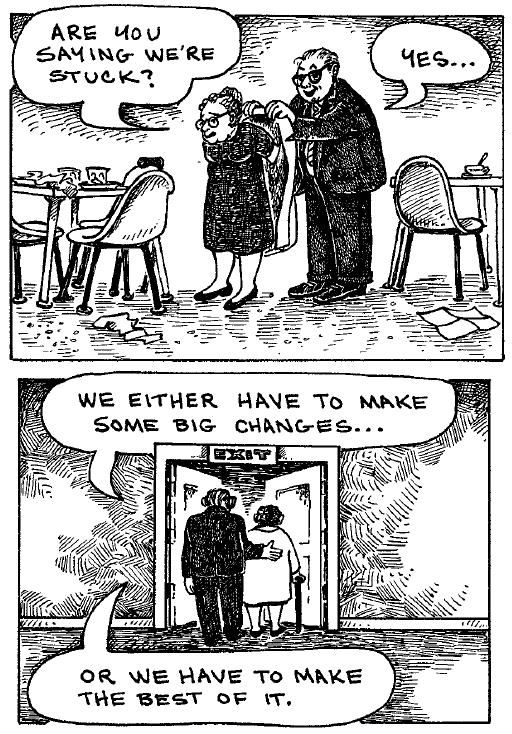When Miles Morales was revealed as the new Spider-Man this week, David Betancourt had a visceral reaction to the news:
My friendly neighborhood Spider-Man was ... just like me?
Like Betancourt, Morales is half black, half Hispanic, but there's more to diversity than ethnicity. Everyone talks about how superheroes are all white, but nobody talks about how they are all young. A middle-aged superhero is usually the butt of a joke, but outside the capes-and-tights realm, there is a growing category of comics about the trials and joys of middle age.
When I was young, I looked upon aging as a horror show—your looks deteriorate, your parents get sick and die, your kids get snottier and snottier and then move away, and every visit to the doctor carries the potential of a nasty test or a bit of bad news. Instead of daydreaming about accepting the Nobel Prize, you spend your days thinking about boring things like health insurance, car maintenance, and college tuition. The cheery nihilism of youth gives way to the humdrum of necessity and responsibility. What I am learning, though, is that as difficult as all this can be, there are also moments of grace and even humor. You don't stop living and growing and changing once you turn 40. Every stage of life is full of stories.
So I am really happy to see more and more comics that look at the world from a more mature point of view: Carol Tyler's You'll Never Know, Joyce Farmer's Special Exits, Ross Mackintosh's Seeds, all are family stories about adults dealing with their parents' aging, ailments, and finally, death. Neill Cameron's Admission is about his first encounter with the medical system as a sick person, that flash of realization that you are not invulnerable—something many of us will go through in our middle decades. At the comedy end of the spectrum, Jennifer Hayden's Underwire is a light-hearted take on middle age that takes an affectionate look at life as the mother of teenagers. This stage of life provides rich material for stories, and it's wonderful to see them being told. It's also wonderful to read these and know I am not alone.
If the first half of your life is all about gaining control of your world and developing autonomy—leaving home, falling in love—the second half is more about realizing you don't have that much control after all. The stories may change, but they don't need to stop. My father spent the last three years of his life in an Alzheimer's unit of a nursing home, and I visited him there almost every day. I could have filled a daily comic strip with tales of the patients and staff there (except I was too tired). I could write a thick graphic novel about being the mother of two teenagers (except they would kill me). Excuses aside, I'm glad there are creators who are willing and able to tell stories about the second half of life, and I hope that they will continue to do so, so there will be stories not just about taking care of your frail parent but about being the frail parent, and all the richness of experience that comes with old age. As long as we are living and breathing, there are stories to be told.


